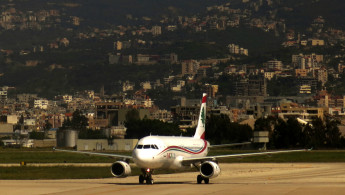Lebanon's national airline signs largest ever bilateral deal with Rolls-Royce amid 'transparency concerns'
MEA and Rolls-Royce signed the contract in a ceremony in London on Wednesday, during the Lebanon-UK Business and Investment Forum attended by Lebanon's Prime Minister-designate Saad al-Hariri and Alistair Burt, UK Minister of State for International Development and Minister of State for the Middle East.
As part of the deal, the UK engine maker will provide support for the Trent 7000 engines powering MEA's new Airbus A330-900neo fleet, which promises to be considerably more fuel efficient than airplanes currently operated by the carrier.
"The aircraft will provide MEA with a 14 percent fuel burn improvement per seat, and increased range, compared with the airlines' existing A330 aircraft," aviation expert Alex Macheras wrote on his blog.
"With the latest A330neo order, Middle East Airlines is set to become a very efficient airline, with significant growth potential," he added.
Despite this game-changing potential for the small country's aviation, the deal has proven to be a source of political controversy in Lebanon, which continues to be gripped by a government formation crisis.
Last week, Lebanon's anti-graft minister Nicolas Tueni, who is close to President Michel Aoun, said he would "take legal measures to force the MEA's board of directors to disclose details" about the deal, which dates back to 2016.
Tueni said that since the airline is 99 percent owned by the Central Bank, it must comply with public sector rules on tendering.
However, the airline's CEO Mohammad al-Hout, close to Hariri, refused to comply with the minister, saying the airline is a private company, complying with the rules of commercial law.
|
In London, Hariri said the business forum marked a new milestone in UK-Lebanon relations.
"This forum and the subsequent follow up to it will mark the beginning of a new journey in the Lebanese-British business and investment relations, one that builds on the solid partnership of the past and paves the way for increased cooperation and new ventures," he said.
The event comes amid warnings that Lebanon's economy is on the brink of collapse due to high levels of debt and a drawn out political crisis.
Lebanon's economy has been on the brink of collapse for some time but a Paris conference, dubbed CEDRE in April, earned it $11 billion in aid pledges.
Polls held the following month gave Hariri a new term as prime minister but Lebanon's fractious political class has since failed to agree on a government line-up.
Seven months on, a breakthrough does not seem imminent.
Government formation is often a drawn-out process in Lebanon, where a complex governing system seeks to maintain a precarious balance of power between its various political and religious communities.





 Follow the Middle East's top stories in English at The New Arab on Google News
Follow the Middle East's top stories in English at The New Arab on Google News
![The UAE is widely suspected of arming the RSF militia [Getty]](/sites/default/files/styles/image_330x185/public/2024-11/GettyImages-472529908.jpg?h=69f2b9d0&itok=Yauw3YTG)
![Netanyahu furiously denounced the ICC [Getty]](/sites/default/files/styles/image_330x185/public/2024-11/GettyImages-2169352575.jpg?h=199d8c1f&itok=-vRiruf5)
![Both Hamas and the Palestinian Authority welcomed the ICC arrest warrants [Getty]](/sites/default/files/styles/image_330x185/public/2024-11/GettyImages-2178351173.jpg?h=199d8c1f&itok=TV858iVg)